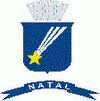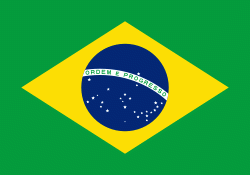Natal (Natal)
 |
 |
The Brazilian coast has long been home to indigenous peoples, generally members of the Tupi language family. While written records do not exist, archeological evidence suggests that pre-European inhabitants moved from the Amazon to the coasts approximately 2,900 years ago.
Near the Rio Grande de Norte, the Potiguara people were the most numerous indios encountered by the Portuguese. It is believed that in 1500, prior to contact with the Europeans, there were over 1 million people living in coastal Brazilian among all of the local groups. This nearly equaled the population of Portugal at the time.
The northeastern tip of South America, 20 mi to the north of Natal and the closest point to Europe from Latin America, was first visited by European navigators in 1501, as part of the 1501–1502 Portuguese expedition led by Amerigo Vespucci. Vespucci renamed the area after the saint of the day, Cape São Roque; the prior indigenous name is unknown. For decades thereafter, no permanent European settlement was established in the area.
In 1597, after some years during which French pirates, led by Jacques Riffault, established regular commercial activities with the native population, the ninth Portuguese Governor-General of Brazil, Francisco de Sousa, ordered the expulsion of the buccaneers. The successful expedition against 50 Frenchmen and their Amerindian allies was led by the Captain-Major of the Captaincy of Pernambuco, Manuel de Mascarenhas Homem, with the assistance of Jerônimo de Albuquerque Maranhão.
Albuquerque Maranhão began on January 6, 1598, the construction of the Fort of the Holy Kings or of the Magi-Kings ("Forte dos Santos Reis" or "Forte dos Reis Magos"), named after the Three Wise Men, honored in the Christian feast of the Epiphany, celebrated on that day.
Natal (which translates to "Nativity" or "Christmas" in Portuguese) was founded on December 25, 1599, giving the village outside the fort the modern name of the city. The fort, city, and surrounding areas were occupied by Dutch forces from 1633 to 1654. They rechristened the fort "Fort Ceulen" after one of their commanders. The sandy soil of Natal prevented the city from becoming a producer of sugarcane during the colonial times. For centuries, the economy of the state was based on the raising of cattle in the dry interior lands. Cattle were sent alive to the larger centers, to be used as traction, or were turned into jerked beef, for food; the most typical food of Natal, "carne de sol" (sun meat), has origins in that jerked beef.
In the last century, Natal benefited from the growth of the salt industries (the north of Rio Grande do Norte is the largest producer in Brazil) and petroleum (the largest inland Brazilian reserves are in the State). Natal grew quickly, but in a somewhat planned way (compared to other major Brazilian cities). Tourists (first Brazilians, more recently foreigners) discovered the city, which became one of the major tourist destinations in Brazil.
Because of its strategic position (Natal is one of the cities in Brazil nearest to Western Europe and Africa, especially Dakar, Senegal), an American air base was built in a suburb of Natal named Parnamirim during World War II, as part of the so-called Operation Rainbow. This base provided support for allied troops fighting in north Africa. Thousands of American soldiers were sent to Natal. Their presence left traces in the culture of the city. The city also held the Potenji Conference, which took place right after the Casablanca Conference and defined the active participation of Brazil in the war, being the only Latin American country to send troops overseas to fight in Europe.
Map - Natal (Natal)
Map
Country - Brazil
Currency / Language
| ISO | Currency | Symbol | Significant figures |
|---|---|---|---|
| BRL | Brazilian real | R$ | 2 |
| ISO | Language |
|---|---|
| EN | English language |
| FR | French language |
| PT | Portuguese language |
| ES | Spanish language |


















